Speech is about to beginpublished at 14:00 GMT 2 March 2023
Sir John's speech is about to start, so if you want to watch it live alongside our updates, press the Play icon at the top of this page.
The head of MI5 has released a statement saying he is "profoundly sorry" that the agency did not prevent the 2017 Manchester Arena attack
This comes after an inquiry finds that the security service missed a "significant" chance to take action that might have prevented the atrocity
Chairman Sir John Saunders says the reasons for this include a "failure" by an MI5 officer to act swiftly enough
Families of the 22 who were killed in the attack say it's a "devastating conclusion"
The inquiry also finds that bomber Salman Abedi probably received help from someone in Libya, contradicting an MI5 assessment
Sir John also says that Abedi should have been referred to the counter-extremism Prevent programme
Home Secretary Suella Braverman calls it a "difficult day", vowing to do "everything possible" to prevent a repeat of the attack
Edited by Jamie Whitehead
Sir John's speech is about to start, so if you want to watch it live alongside our updates, press the Play icon at the top of this page.
Before inquiry chairman Sir John Saunders speaks this afternoon as the final report is published, there will be a minute's silence to remember those who died in the attack in 2017.
Speaking in November 2022, GMP police chief Stephen Watson says: "I am truly sorry"
Speaking at the time of the second report, Stephen Watson, chief constable for Greater Manchester Police, said the force's co-ordination "to the response of this atrocity was poor".
"To the families and the loved ones of those who died, I am truly sorry," he said.
Watson was appointed last year and was not in charge when the attack happened in 2017.
 Gem O'Reilly
Gem O'Reilly
Live reporter
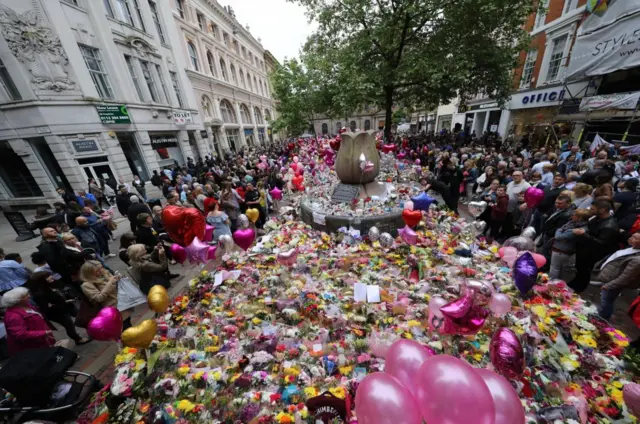 Image source, PA Media
Image source, PA MediaSt Ann’s Square on 29 May 2017, one week after the attack
I was in Manchester with friends and had parked on the other side of the arena in a car park facing the complex.
My friends and I were entering Victoria Station to retrieve my car when we heard a huge explosion.
I remember freezing on the spot, not knowing what to make of it.
Shortly after, we started to see people running towards us, trying to exit the station. We ran with them.
A young girl latched on to my arm, crying and telling me she couldn’t find her boyfriend. I remember reassuring her that everything would be OK.
Manchester changed that day for us. A city that revolved around music and the buzz of the arena felt entirely hit by this devastating attack.
I remember walking through the centre in the days after the attack and seeing the waves of flowers, balloons and messages. It made the hairs stand up on my neck.
From then, it felt like Manchester came together, the northern spirit of “this won’t beat us” came through.
But I know that I’m not the only one who will never forget that day.
The inquiry published its penultimate report in November. Here’s a rundown of some of the key findings:
The full report, titled Volume 2: Emergency Response, can be read here, external.
 Nick Garnett
Nick Garnett
Reporting from Manchester
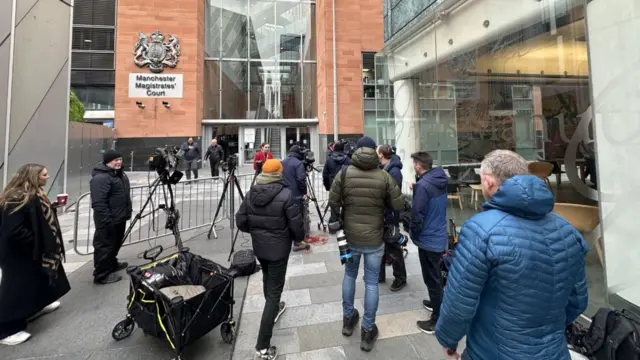
Outside Manchester Magistrates' Court, journalists and TV crews are getting ready for the publication of the report.
Some reporters have been allowed to go inside to read the report ahead of publication in a “lock-in”, but they aren’t allowed to contact their news desks about its contents before the chairman, Sir John Saunders, gives a summary of the inquiry’s findings at 14:00.
Today’s report marks the end of an inquiry that has lasted almost two and a half years. The inquiry heard 196 days of evidence, involved 18 teams of lawyers and the three reports that have been published run into thousands of pages.
The first looked at the preparation, planning and policing on the night, the second at the response of the emergency services.
This report focuses on the radicalisation of the bomber and the role of the security and counter-terrorism services. It may answer one question that still needs to be answered: could the bombing have been prevented?
Manchester Arena is situated in the centre of the city, near the Manchester Arndale shopping centre. The concert hall in Manchester’s largest, with a capacity of around 21,000.
The bomb was detonated near the box office at the entrance to the arena, which is situated above Victoria train station.
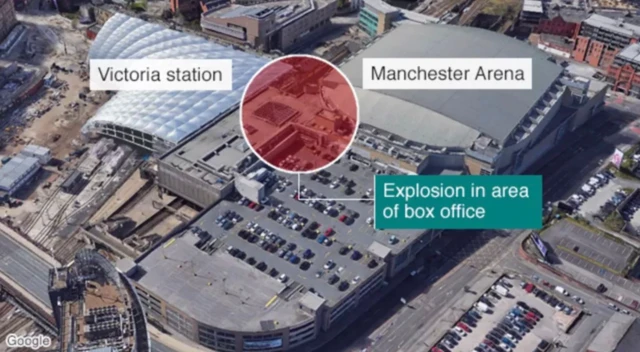
Since the attack, Manchester Arena has increased its security to enter the concert hall.
In the recommendations, external of the inquiry, security at the arena was mentioned as an area of consideration.
Salman Ramadan Abedi was 22 when he carried out the suicide bomb attack at Manchester Arena on 22 May 2017.
Abedi was born in Manchester on 31 January 1994 to Libyan parents. His family fled Libya after becoming opponents of Col Gaddafi's regime.
He attended Burnage Academy for Boys in Manchester between 2009 and 2011, before going to The Manchester College until 2013. He went to Salford University in 2014.
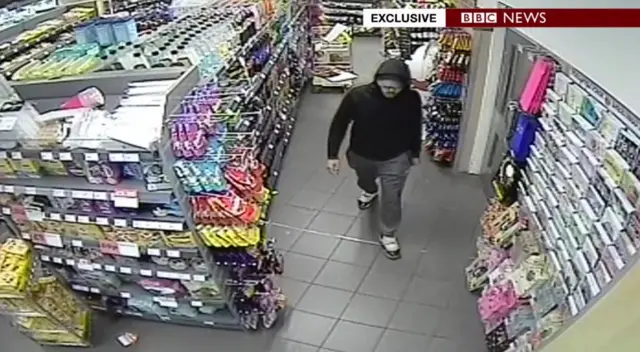
CCTV footage given to BBC News showed Salman Abedi in a shop the day before the attack
Abedi completed the first year of a business and management degree at the University of Salford. He walked out of an exam in January 2017 and wasn't heard from by the university again, the inquiry, external into the attack heard.
A former classmate of Abedi told the BBC: "I wasn't shocked. He fits the profile for a suicide bomber.”
Abedi had a sister and two brothers. His brother Hashem was jailed for 55 years in 2020 after it was found that he helped his older sibling Salman to plan the atrocity.
The brothers spent months ordering, stockpiling and transporting the deadly materials required for the attack.
Salman Abedi hid for one hour, before walking across the foyer as the concert ended to set off his bomb.
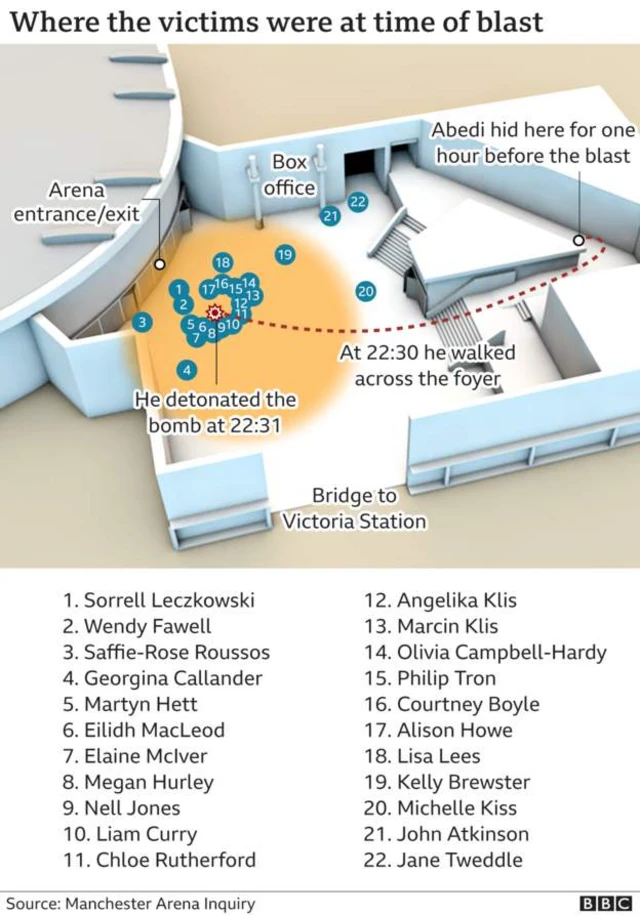
There were 22 victims who died in the Manchester Arena attack and 59 injured. The youngest was just eight years old.
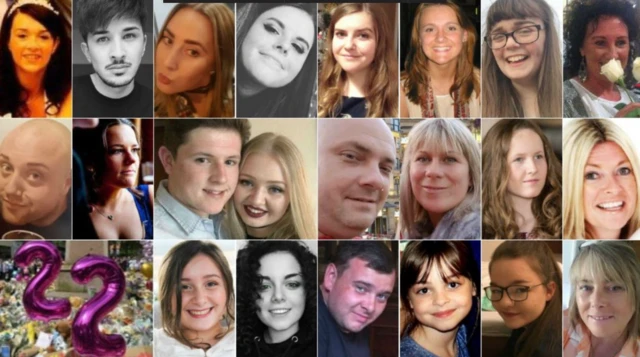
The family members of the 22 recently hace previously paid tribute to them and their lives. The mother of the youngest victim, Saffie Rose Roussos, described her as a “beautiful soul”.
The victims were at the arena because of US pop star Ariana Grande’s concert. They had travelled both locally and from afar to see it. Salman Abedi set off a bomb in the foyer at 22:33 BST on Monday 22 May 2017 at the end of the show.
A public inquiry, external into the Manchester Arena attack started in 2019 to investigate the deaths. It delivered the second volume of its report in November 2022 and publishes the third today.
 Nick Garnett
Nick Garnett
Reporting from Manchester
The first two reports from the public inquiry into the bombing concentrated on the events immediately surrounding the terrorist attack.
This third and final report by the inquiry chairman, Sir John Saunders, will focus on what the intelligence and counter-terrorism services knew about the attacker Salman Abedi.
Much of the evidence was heard behind closed doors.
Only the chairman and his legal team were allowed to hear what was said by the MI5 officers who were called to give evidence.
The key question is straightforward: could the bombing have been prevented?
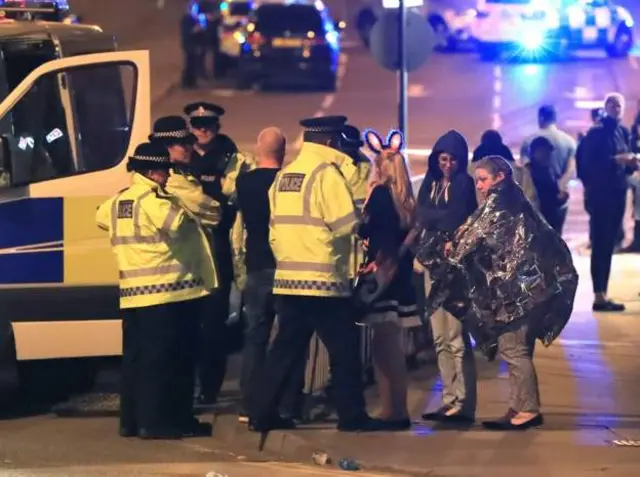 Image source, PA Media
Image source, PA MediaTwenty-two people were killed, and hundreds more injured, when a suicide bomber blew himself up in the foyer of Manchester Arena just after 22:30 BST.
Inside, thousands of fans were making their way out of a concert by US artist Ariana Grande.
Outside, Salman Abedi, the bomber, stood among parents waiting to collect their children - and detonated a homemade bomb.
Greater Manchester Police subsequently declared the incident a terrorist attack and a suicide bombing. It was the deadliest attack in the UK since the 7 July 2005 London bombings.
Salman’s brother, Hashem, has been jailed for at least 55 years for helping his older sibling plan the attack. He was convicted in 2020 after a court heard he was "just as guilty of murder" as his brother.
The year before Hashem’s conviction, the government launched a public inquiry into the attack and the response to it.
The first report - released last year , external- focused on the arena’s security. The second looked at the emergency services. The third report being released today is due to look at whether security agencies could have stopped the bombing.
Jamie Whitehead
Live reporter
Good afternoon and thank you for joining us.
We’re waiting for the release of the third, and last, report from the public inquiry into the deaths of the 22 people killed in the Manchester Arena bombing in 2017.
These findings will consider how the attacker, Salman Abedi, was radicalised and if security services missed the chance to stop him.
We’re expecting these to be published at around 14:00GMT, so stay with us for the latest updates as well as analysis and reaction from the victims’ families.
I’ll be hosting this afternoon’s coverage along with Alexandra Fouché, and we’re joined by live reporters Anna Boyd, Rachel Russell, James FitzGerald, James Harness, Heather Sharp and George Wright.